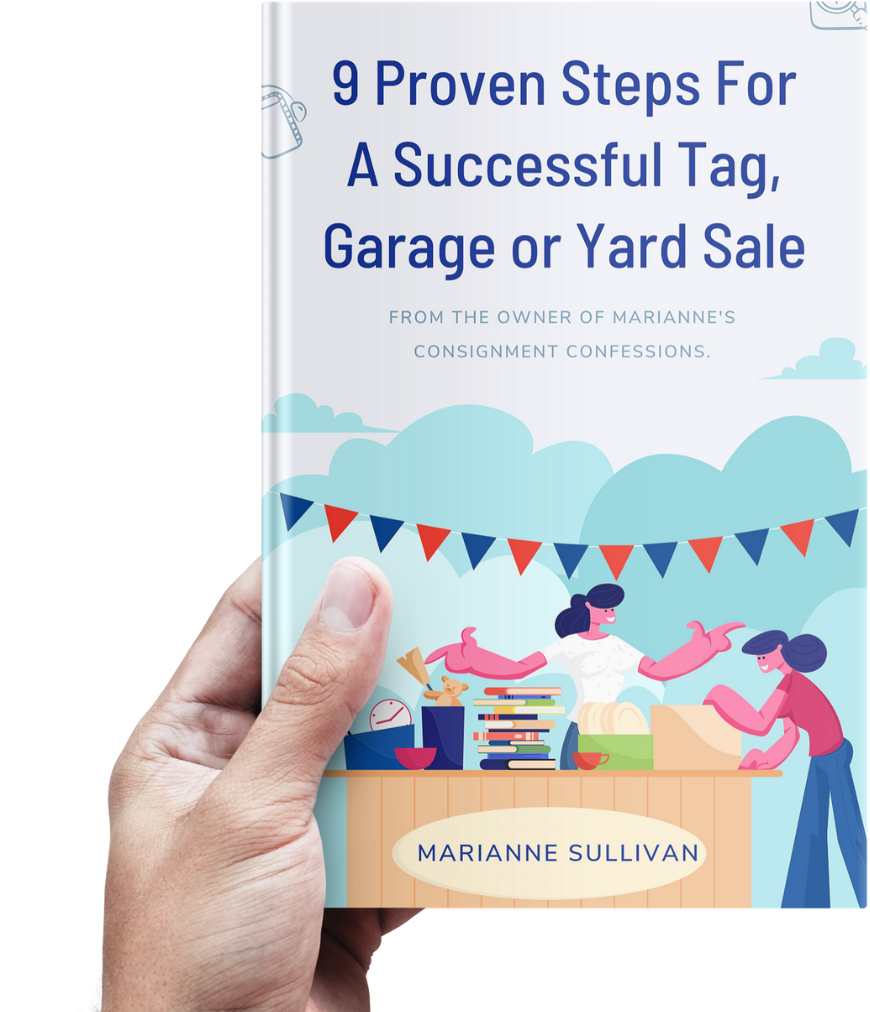
It is fair to say that I know a thing or two about consigning. I have owned my own home consignment store for almost 18 years. I have over 7000 registered consignors and over a million customers have come through my doors. I’m not versed in every form of consignment (for example, don’t ask me about cars, I haven’t a clue). As for the rest of it, I would say I know more than the average bear. If you’re considering consignment and want to know how consignment works, this article is for you.

What Is Consignment? And How Does Consignment Work?
Let’s start with a good definition: Consignment is an arrangement between a reseller (consignee) and their supplier (consignor), that allows the reseller to pay for their products after the products have been sold. In other words, you have “stuff” that you no longer want (or purchased to resell). You bring it to the consignee (shop or online site) in order that they might sell it for you. They market it to their established network of clients. When your items sell, the consignee pays you an agreed upon percentage of the sale price.
Consignment Stores Require Things Like…
Most consignment stores, like my store, Consignments Ltd., require the consignor to make an appointment to bring in their items. It’s just how consignment works best. At the appointment, they either go through the items whilst you wait or they review them after you drop them off. The shop returns or disposes of unsellable items. Usually you have to sign a contract with their terms spelled out. The consignee will give you a certain time period where they agree to sell your items. Most shops will spell out their policy for return of unsold items in their contract, as well as how often you are paid, how you are paid, etc.
Different Shops, Different Rules…
Not all consignment shops are the same. And not all shops are good at what they do. You will want to ask around, check with your friends, check out their websites and online reviews. Remembering that shops can’t always make everyone happy, but look for positive or negative trends. Once you’ve found a shop you think is worth the effort, go see it for yourself. This will tell you a lot. Is it clean? Well-organized? Set up for easy shopping? Then, make your appointment and start getting your items ready. You’ll want to: 1. Be a Good Consignor and 2. Make Good Money doing this, so read on for tips on both…

How Consignment Works Best… Be A Good Consignor
My staff and I discuss this topic quite often. What makes one person successful at consigning and another not so much. In the opinion of the staff of Consignments Ltd. success starts with being a good consignor. From our perspective there are a few key things that make this business arrangement work well:… it’s how consignment works best.
Read The Contract… It’s How Consignment Works… Literally:
- Like any good business arrangement, the consignment contract spells out the details of the working relationship. Read the darn thing and ask questions up front, so you know what to expect from consigning your goods.
Be On Time For Your Appointment:
- Every business, including a consignment shop, has to manage work flow. They give you an appointment time because that helps them schedule work and staff. Being on time is not only courteous, but it means you are more likely to get the attention you deserve. If you’re going to be late or have to miss your appointment, make sure to call. It’s just right and fair. It’s how consignment works best.
Bring ONLY Clean Items That Are In Good Condition:
- I could fill a football stadium, to the roof, with the dirty and/or broken items people have tried to drop off for consignment. I think some people maybe don’t see the dirt or flaws and others expect that my staff will clean the items for them. Either way, these items are not going to be accepted and you waste your own time and that of the shop when you bring these items to your appointment.
Get A List of Your Items and Stay On Top of Your Sales:
- Most consignment shops have a system for giving you an inventory of your items, whether it’s software-based, or a good-old-fashioned typed list, you should get an inventory, with prices, anytime you consign and whenever you request one. If a shop can’t provide this, please beware.
Pick Up Your Unsold Items In A Timely Manner:
- Consignment contracts vary in length and terms, but what all have in common is that they are NOT infinite. Your contract period will have an end date. If you want your items back, know your end date and act accordingly. Coming in a year after your 90 day contract is up and expecting returned items is just foolhardy.
Pick Up Your Checks In a Timely Manner:
- Most states have a limit on how long a check is good for (my state, Rhode Island says checks are only good for 6 months). If the consignment shop you choose pays by check, make sure you know this information.
Consign Regularly and Tell Your Friends About Good Experiences:
- All business, like all politics, is local. If you have a good experience consigning, share it with friends. Your shop will appreciate your referral and the added business will keep them going strong, so that you, and your friends, can consign again… and again.
Be A Customer, As Well:
- I always tell new staff that, “we have two sets of customers, consignors and purchasers of consigned items.” If you become a customer where you consign, you will better understand the process from both perspectives. This understanding will help you be a better consignor and therefor make you more successful at consigning.

How To Make Good Money Consigning?
A lot of the information about being a good consignor will, by its very nature, make you more financially successful with your consigning. There are a few other “tricks of trade” to keep in mind, as well:
“Market” Your Items Attractively:
- This is best explained by illustration. For example, if you’re bringing in a stack of appetizer plates for consignment, perhaps you tie them together with a cute ribbon or box them (without a lid) in a stylish box. Or if you’re consigning a fun pink raincoat, perhaps you attach the hat that you’re also consigning, so that the customer sees the “set.” Bringing in a set of six, matching wine glasses? Perhaps you can “merchandise” them in a cardboard, six-pack holder that you would otherwise recycle. Bringing in a tablecloth (ironed please), attach a tag with the measurements. You are marketing these items so that the shop doesn’t have to. Your profits will show that the little extra effort is worth it, I assure you.
Consider Seasonality:
- If you’re consigning clothing at the consignment shop, this one is pretty easy – spring clothing in springtime, winter in winter. Home consignment shops are affected by seasonality as well. To get the best money for your items (and make sure that the shop is willing to take them), bring items in their season. For the 4th of July, red-white-and-blue plates you have, make sure you bring them in late May or early June and not in October. Have Christmas items? Ask the shop. We start taking items on September 1st at Consignments Ltd. and we stop taking them by December 1st. Think in-season and make more cash.
Stick With In-Style and Desirable Vintage Items:
- Yes, it is true, every style repeats itself… eventually. But if the style of your item hasn’t seen the light of day in over a decade, it’s probably not worth your time bringing the item to your appointment. When in doubt, call ahead. Most shops are more than happy to clue you in on what they’ll take. Send them an email, including pictures, if you want to be doubly sure.
Draw Attention To Brands and Price Points:
- When you bring your items in for consignment, don’t assume that the shop will know who made the item or what you paid. Tell them any pertinent information so they don’t have to guess. This will not guarantee that you’ll make millions, but it will assure you that the shop knows at least what you know. They will price according to market, but they will know what they are marketing.
A Final Thought…
I never mind answering questions about consignment, so feel free to reach out if you’d like an opinion. For more on the topic, check out my other blog: Best Item To Buy At Thrift and Consignment Shops. As always, stay safe out there, my friends… and have fun!








No Comments